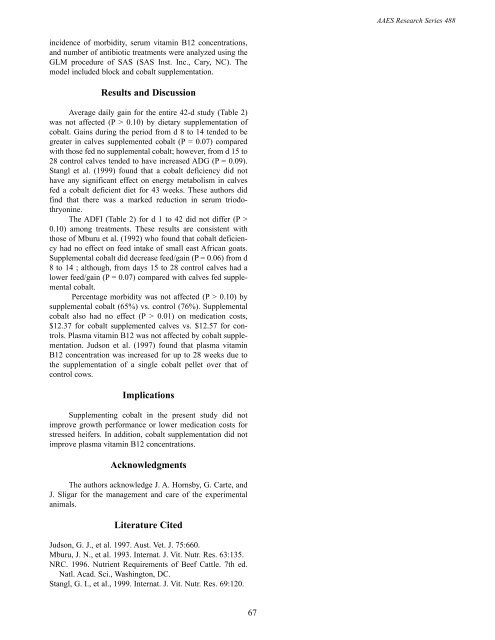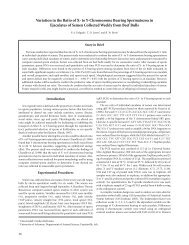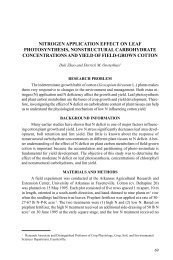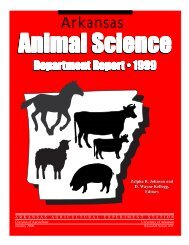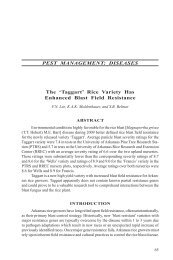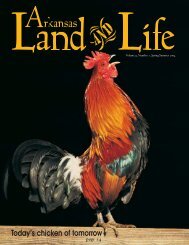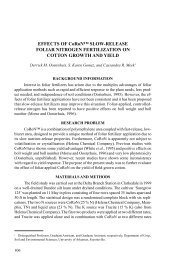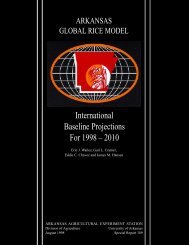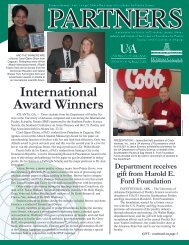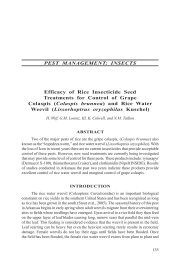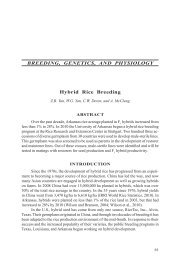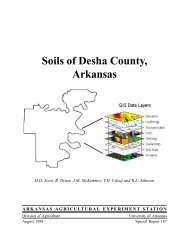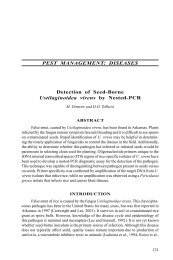Arkansas - Agricultural Communication Services - University of ...
Arkansas - Agricultural Communication Services - University of ...
Arkansas - Agricultural Communication Services - University of ...
Create successful ePaper yourself
Turn your PDF publications into a flip-book with our unique Google optimized e-Paper software.
AAES Research Series 488<br />
incidence <strong>of</strong> morbidity, serum vitamin B12 concentrations,<br />
and number <strong>of</strong> antibiotic treatments were analyzed using the<br />
GLM procedure <strong>of</strong> SAS (SAS Inst. Inc., Cary, NC). The<br />
model included block and cobalt supplementation.<br />
Results and Discussion<br />
Average daily gain for the entire 42-d study (Table 2)<br />
was not affected (P > 0.10) by dietary supplementation <strong>of</strong><br />
cobalt. Gains during the period from d 8 to 14 tended to be<br />
greater in calves supplemented cobalt (P = 0.07) compared<br />
with those fed no supplemental cobalt; however, from d 15 to<br />
28 control calves tended to have increased ADG (P = 0.09).<br />
Stangl et al. (1999) found that a cobalt deficiency did not<br />
have any significant effect on energy metabolism in calves<br />
fed a cobalt deficient diet for 43 weeks. These authors did<br />
find that there was a marked reduction in serum triodothryonine.<br />
The ADFI (Table 2) for d 1 to 42 did not differ (P ><br />
0.10) among treatments. These results are consistent with<br />
those <strong>of</strong> Mburu et al. (1992) who found that cobalt deficiency<br />
had no effect on feed intake <strong>of</strong> small east African goats.<br />
Supplemental cobalt did decrease feed/gain (P = 0.06) from d<br />
8 to 14 ; although, from days 15 to 28 control calves had a<br />
lower feed/gain (P = 0.07) compared with calves fed supplemental<br />
cobalt.<br />
Percentage morbidity was not affected (P > 0.10) by<br />
supplemental cobalt (65%) vs. control (76%). Supplemental<br />
cobalt also had no effect (P > 0.01) on medication costs,<br />
$12.37 for cobalt supplemented calves vs. $12.57 for controls.<br />
Plasma vitamin B12 was not affected by cobalt supplementation.<br />
Judson et al. (1997) found that plasma vitamin<br />
B12 concentration was increased for up to 28 weeks due to<br />
the supplementation <strong>of</strong> a single cobalt pellet over that <strong>of</strong><br />
control cows.<br />
Implications<br />
Supplementing cobalt in the present study did not<br />
improve growth performance or lower medication costs for<br />
stressed heifers. In addition, cobalt supplementation did not<br />
improve plasma vitamin B12 concentrations.<br />
Acknowledgments<br />
The authors acknowledge J. A. Hornsby, G. Carte, and<br />
J. Sligar for the management and care <strong>of</strong> the experimental<br />
animals.<br />
Literature Cited<br />
Judson, G. J., et al. 1997. Aust. Vet. J. 75:660.<br />
Mburu, J. N., et al. 1993. Internat. J. Vit. Nutr. Res. 63:135.<br />
NRC. 1996. Nutrient Requirements <strong>of</strong> Beef Cattle. 7th ed.<br />
Natl. Acad. Sci., Washington, DC.<br />
Stangl, G. I., et al., 1999. Internat. J. Vit. Nutr. Res. 69:120.<br />
67


